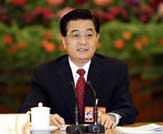Chinese president ends African tour by drumming for dancers
Chinese President Hu Jintao couldn't resist the rhythm of a drum beat on the last day of his African tour Saturday, and walked off the red carpet at Nairobi's airport to beat a skin drum for traditional dancers.

A smiling Hu squatted beside a surprised Kenyan drummer to demonstrate his drumming skills, catching onlookers off guard with a break in official protocol.
The display was also a break from tradition for Chinese leaders, who are normally reserved in public.
Hu appeared to be in an upbeat mood a day after clinching yet another oil deal, cementing China's growing influence on a continent that is rich in natural resources but is also the world's poorest and most corrupt.
Hu has a keen interest in Africa's vast stores of oil and minerals, and the continent has become a new market for Chinese exporters. But critics say China is abetting pariah nations by doing business with countries like Sudan and Zimbabwe.
Unlike Western countries just as interested in Africa's markets and resources, China steers away from pressuring nations on their human and political rights records.
"It is our wish that your country will continue to use its growing economic strength to support developing countries," Kenya's President Mwai Kibaki, who is under pressure from Western donors to curb corruption in the country, said during a state banquet late Friday.
Hu said China was stepping up plans to assist developing countries, including zero-tariff on some exports, more aid, debt reduction and exemptions for exports from heavily indebted poor nations.
Earlier this week, Hu signed a series of major business deals with Nigeria, Africa's biggest oil producer. Militants claiming responsibility for oil-installation attacks and kidnappings that have shut down more than 20 percent of Nigeria's oil production this year vowed more violence in response to the Chinese deals.
China's oil firms began investing abroad in the late 1990s, after double-digit economic growth outstripped supplies from domestic fields.
On the back of an economy that is heading into its fourth year of 10 percent growth and has become the world's third-largest trader, Chinese leaders have won over Southeast Asian neighbors with trade, raised China's investment and presence in Africa and Latin America and gained access to oil from strategically shaky Central Asia and the Middle East.
But China's investments in places like Sudan have prompted concerns about human rights. China, a veto-wielding U.N. Security Council member, has offered key diplomatic support to Sudan and other countries shunned by the West.
Decades of low-level clashes over land and water in Sudan's Darfur region exploded in early 2003, when ethnic African farming tribes rebelled and accused the Arab-dominated central government of neglect. The government allegedly urged militias from nomadic Arab tribes to attack villages a charge it denies. The conflict has caused about 180,000 deaths most from disease and hunger and displaced 2 million people in a vast, arid region, reports AP.
O.Ch.
Subscribe to Pravda.Ru Telegram channel, Facebook, RSS!


